Issue
- Current hybrid scenarios
- Future hybrid scenarios in ESET PROTECT Hub
- Impact on Resellers and MSPs
- Improvements introduced by ESET PROTECT Hub
- Migration scenarios for ESET Business Account and ESET MSP Administrator into ESET PROTECT HUB
- Implications of migrating resellers disguised as customers in ESET Business Account
- Example scenario
- Current limitations
- Merge ESET Business Account as My Company to ESET MSP Administrator
- Migrate ESET Business Account and ESET MSP Administrator as separate entities into ESET PROTECT Hub
Solution
ESET PROTECT Hub simplifies and enhances reseller, Managed Service Provider (MSP), and end-customer scenarios. This guide explains how current ESET MSP Administrator (EMA) or ESET Business Account (EBA) hybrid scenarios will be supported in ESET PROTECT Hub and outlines the migration process for handling such cases.
Current hybrid scenarios
Below are definitions of “hybrid” scenarios. In the context of ESET Business Account and ESET MSP Administrator, several options can be considered hybrids:
-
Shared Root User Email*: ESET Business Account/ESET MSP Administrator shares the same root user email.
* = Root or superuser is the owner of a specific ESET Business Account/ESET MSP Administrator account -
Shared Non-Root Users: Both ESET Business Account and ESET MSP Administrator have common non-root users.
-
Shared ESET PROTECT or ESET Inspect: ESET Business Account and ESET MSP Administrator utilize the same ESET PROTECT or ESET Inspect.
-
Shared Company Information: ESET Business Account and ESET MSP Administrator belong to the same company and share company-related data.
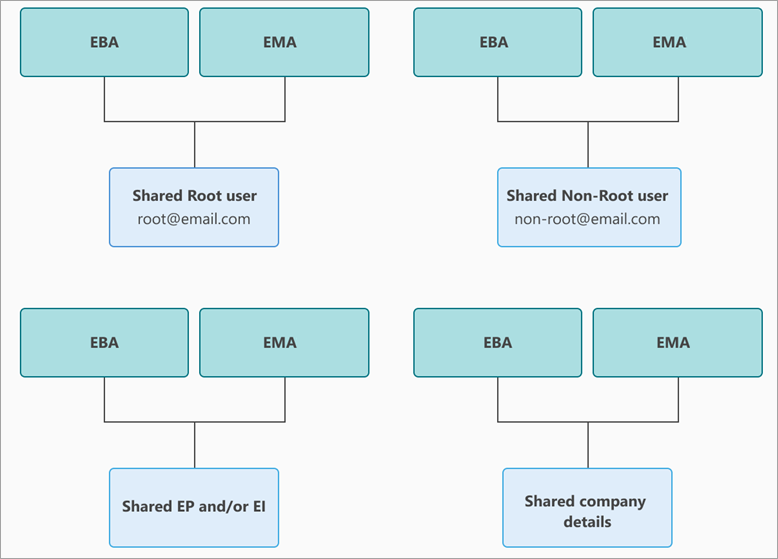
However, reality is often more complex, as these four cases can overlap or be mutually exclusive. Below are some real-world examples:
-
Separate ESET PROTECT or ESET Inspect: Customer insists on having two separate ESET PROTECT or ESET Inspect instances despite sharing the same root user email and company information.
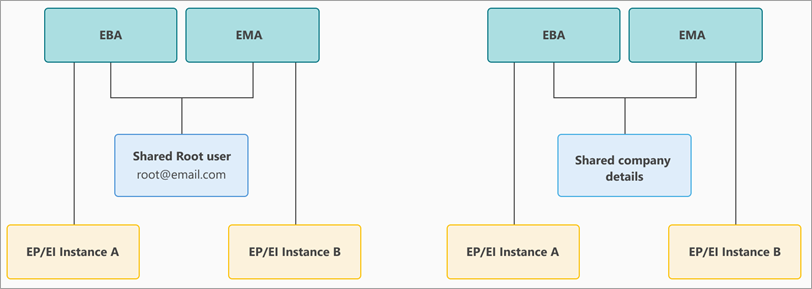
-
Cross-User Integration: ESET MSP Administrator contains users from multiple ESET Business Accounts (and vice versa). This integration may occur when a customer requests support from a reseller (MSP) by inviting them to their account.

-
Reseller Misuse: Resellers sometimes misuse ESET Business Accounts as an MSP portal. In such cases, although they may share users and cloud services, ESET Business Accounts represents one of their customers rather than their own company.
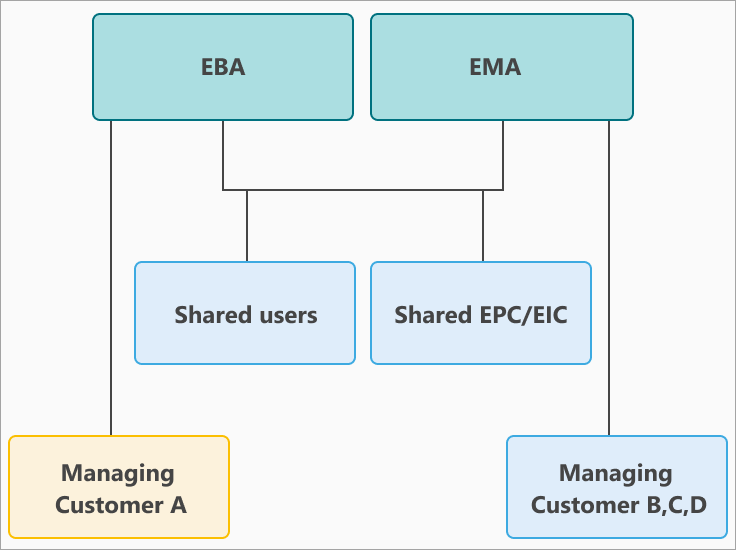
Future hybrid scenarios for ESET PROTECT Hub
ESET PROTECT Hub focuses on simplification and unification of common scenarios. Below are examples of how ESET addresses hybrid scenarios:
-
Streamlining Use Cases:
- We simplify the handling of hybrid scenarios
- We provide clear guidelines to identify and manage hybrids effectively
-
User-Friendly Migration Process:
- During migration, we ensure a smooth transition for hybrid scenarios
- We highlight the desired solution (e.g., Multi-factor Authentication) as a priority
Impact on Resellers and MSPs
Below are examples of how this impacts Resellers and MSPs:
Resellers
- Accurate Representation: Resellers will now be correctly represented in the partner hierarchy
- Dedicated Portal: Resellers will receive a dedicated portal within ESET PROTECT Hub. This portal will streamline their common tasks related to selling and customer support
- No More ESET Business Accounts Misuse: Resellers will no longer need to misuse ESET Business Accounts to provide support for their customers
- MSP Conversion: ESET PROTECT Hub will offer resellers the opportunity to convert directly into the MSP program through its user interface
MSPs
- Non-MSP Subscriptions: MSPs will gain the ability to add non-MSP subscriptions (subscriptions ordered outside of ESET MSP Administrator or ESET PROTECT Hub) to their customers. This eliminates the need to misuse ESET Business Accounts for this purpose
Improvements introduced by ESET PROTECT Hub
My Company concept
For scenarios where distributors, resellers, or MSPs want to manage their own security using ESET applications, we introduce the concept of My Company:
- Automatic Creation: When using My Company, we automatically create a customer account associated with the distributor, reseller, or MSP
- Single Portal: MSPs will no longer need to access separate portals (ESET Business Account and ESET MSP Administrator). Instead, they can manage their own security and that of their customers directly via ESET PROTECT Hub. This includes a single instance of each cloud console (ESET PROTECT, ESET Inspect, ECOS, ESAC, and more)
One user in many companies concept
In cases where users need to be part of multiple separate companies, we introduce the concept of one user in many companies:
- Flexibility: Users can now associate with any number of companies
- Overcoming ESET Business Account and ESET MSP Administrator limitations: Unlike ESET Business Account and ESET MSP Administrator, where a user can be part of only one ESET Business Account and one ESET MSP Administrator company, this concept removes such limitations. Users can seamlessly collaborate across different organizations
Migration scenarios for ESET Business Account/ESET MSP Administrator into ESET PROTECT Hub
Below are examples of the migration process from the current suboptimal state in ESET Business Account and ESET MSP Administrator to the improved environment.
Resellers in ESET Business Account
While analyzing data, ESET identified ESET Business Account accounts that may be resellers in disguise. However, each metric ESET produced (such as ESET Business Account accounts with more than X users, Y sites, or subscriptions ordered for Z different customers) had exceptions. In some cases, these metrics did not accurately identify resellers.
As a result, ESET decided to migrate resellers as they exist in ESET Business Account. They will be treated like ordinary self-managed customers unless the Merge clause specified in the next chapter is applied.
After migration to ESET PROTECT Hub, resellers in disguise will be treated as regular self-managed customers. Below is an example of how their subscription screen will appear:
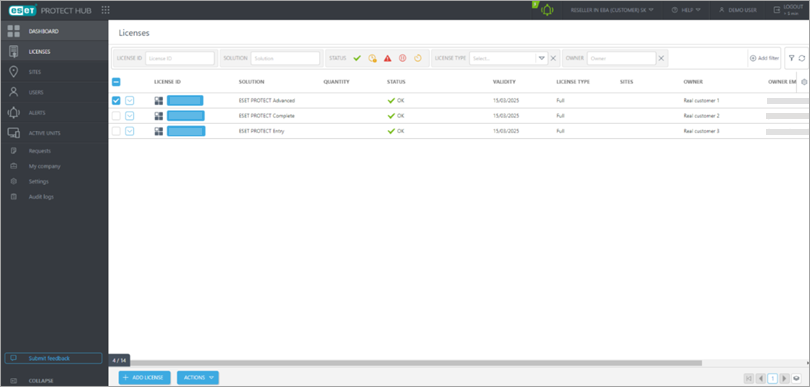
Look at the OWNER column, which represents the real customer’s name for whom the subscription was ordered. Below is an example scenario:
-
Assume that the same email address used by the reseller for creating a customer in ESET Business Account is also associated with the reseller’s root contact user in the Central partner catalog of Dexter.
-
As a result, the reseller will be invited to ESET PROTECT Hub again, but this time as a separate entity called Reseller. The root user will automatically receive the One User in Many Companies capability.
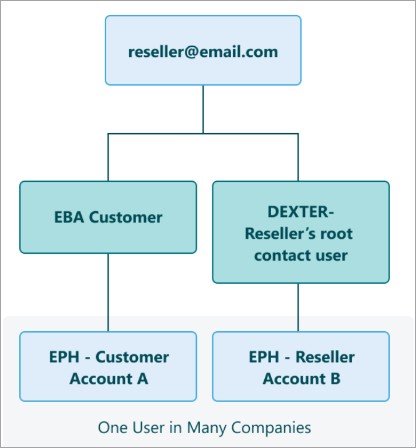
Here is how it will appear for this reseller:
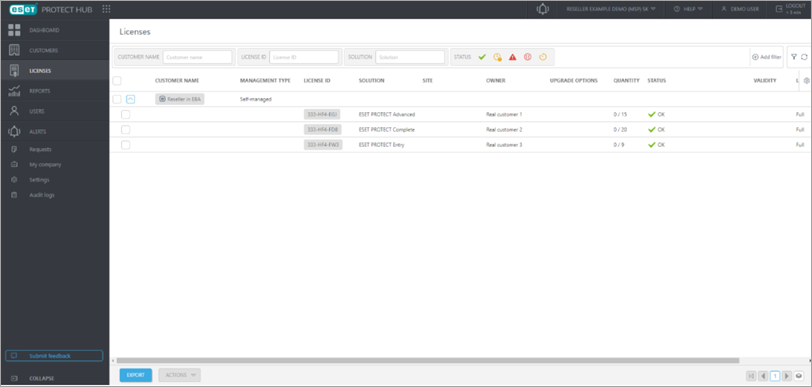
Implications of Migrating Resellers Disguised as Customers in ESET Business Account
As ESET transitions from ESET Business Account and ESET MSP Administrator to ESET PROTECT Hub, it’s essential to understand the implications of migrating resellers who were previously disguised as customers in ESET Business Account. Here are some key points to consider:
-
Flattened Company Structure:
- In the Reseller account, the company structure is flattened to a single customer (the self-managed customer created in ESET Business Account)
- This simplification can complicate search and other operations for resellers
-
Separate Cloud Instances:
- Resellers will be forced to maintain separate cloud instances for their Reseller persona and Self-managed customer persona
- Unfortunately, there is currently no option to merge these instances
-
MSP Business Separation:
- Resellers must separate their MSP business from their existing ESET Business Account standard subscription MSP-like business
- This separation poses challenges if an MSP reseller wants to gradually enroll their customers into the official MSP business channel (currently ESET MSP Administrator)
- The inability to associate MSP subscriptions as self-managed customer subscriptions (only as an MSP reseller) creates this limitation
Example Scenario
-
MSP Reseller A manages Customer A via its Self-managed persona.
- It provides de facto MSP support without dedicated MSP-channeled subscriptions
- However, if MSP Reseller A wants to use MSP-channeled subscriptions for Customer A, they are forced to create Customer A in their MSP reseller persona
- The challenge arises because the reseller and self-managed personas have different EPs
-
Consequently, Customer A will be separated and managed into two different EPs
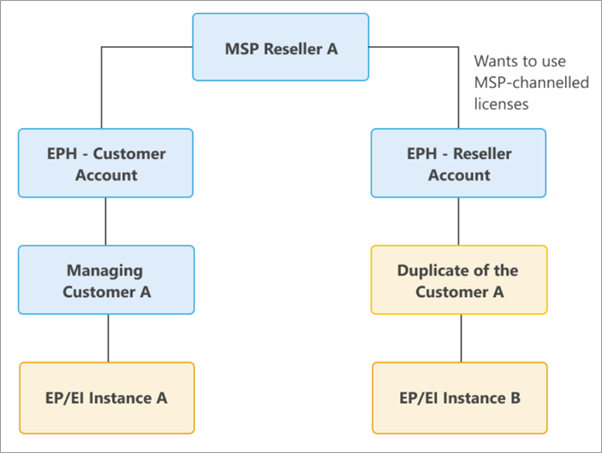
Current Limitations
ESET currently does not have a way for resellers to rectify this situation other than manually dissociating all subscriptions from their self-managed customer persona and associating them with customers in their Reseller persona (along with the creation of those customers).
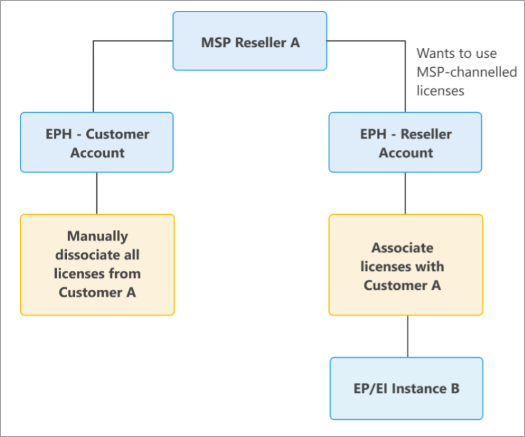
Merge ESET Business Account as My company to ESET MSP Administrator
When ESET Business Account and ESET MSP Administrator accounts are currently interconnected via ESET PROTECT, they will be automatically merged into one account. Specifically:
- The ESET MSP Administrator part will become the MSP
- The ESET Business Account part will become its My Company
Here is how “My Company” will appear across all cloud consoles (ESET PROTECT, ECOS, ESAC):
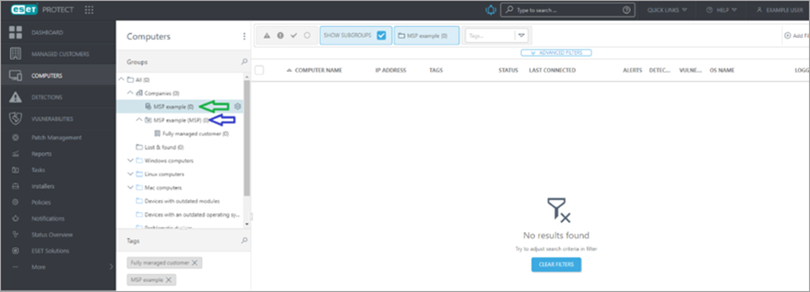
Migrate ESET Business Account and ESET MSP Administrator as Separate Entities into ESET PROTECT Hub
Unless the previous conditions apply to your use case, the automatic merge of the first section and the automatic merge of ESET Business Account as My Company for MSPs is not feasible. So, how will we address those cases?
They Share the Same Root User Email
- In this scenario, EMA will be migrated as an MSP account, and ESET Business Account as a separate self-managed customer account
- The One User in Many Companies (OUMC) concept will apply to the root user

They Share Other-Than-Root Users
- Similar to the first case, companies will be migrated as separate entities, and the OUMC concept will be applied to relevant users

They Share ESET PROTECT or ESET Inspect Instances:
- This case is solved through the merger of ESET Business Account as My Company (as discussed in the previous section)

They Share Common Company Information
- ESET MSP Administrator will be migrated as an MSP and ESET Business Account as a self-managed customer. No direct relationship will be created between them

Manual Merge Feature
While we recognize the need for merging self-managed customers into existing MSPs and Resellers within ESET PROTECT Hub, we currently do not have a confirmed timeline for implementing this functionality. Users will eventually be able to trigger this action directly, but due to the feature’s scope, it won’t be included in the Initial release.